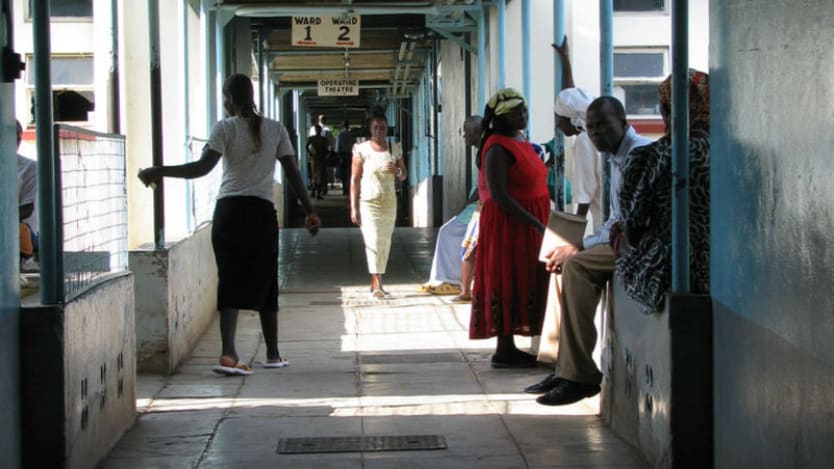Achieving UHC in Africa requires support for most vulnerable, experts say

KIGALI, Rwanda — Achieving universal health coverage remains a challenge in Africa, where customized, quality, and affordable essential health services that meet local demands and reach vulnerable populations often remains an option for a limited few.
On Tuesday, as the second biennial Africa Health Agenda International Conference kicked off in the rainy hills of Kigali, Rwanda, some 1,500 health advocates representing more than 40 countries learned from the successes and setbacks posed by universal health coverage, or UHC, programs in countries such as Rwanda and Kenya.
“Universal health coverage is about equity, not equality.”
— Githinji Gitahi, CEO, AMREF Health AfricaIn Rwanda, for example, community-based insurance has been a solution that provides “the modern social security we want for our people,” Rwanda’s Minister of State for Primary Health Care Patrick Ndimubanzi explained.
This health insurance scheme is financed by both the national government and individuals through insurance and fees for services. Members pay annual premiums at a flat rate based on their economic status, regardless of individual health risks, which can then be used for discounted treatments at community health centers.
Adoption of this scheme increased the number of expectant mothers delivering in health facilities from 50 percent in 2010 to 90 percent in 2015, Ndimubanzi said. Now, 80 percent of Rwandans receive health care from some type of health facility with a skilled health professional.
In neighboring Kenya, a UHC hospital insurance pilot project is currently being tested in four counties stricken with high disease burdens, as part of the government’s larger ambition to achieve universal health coverage by 2022. Since launching in December 2018, the state has offered free basic health care services to all citizens holding a UHC card — which required the presentation of national identification to register — and covers anyone in the household under 18.
“Today, 75 percent of all residents [in the pilot counties] have been registered and are holding a UHC card,” said Rashid Abdi Aman, chief administrative secretary at the Kenya Ministry of Health, explaining that health programs requiring registration may need to be adapted for those who lack identification papers. Initially, he said, utilization of health services in the four counties saw a 100 percent increase, with a particular surge in specialty services, but that now things have stabilized.
Providing an affordable option for Africa’s poorest will be a determining factor whether countries will achieve Sustainable Development Goal 3, which is to “ensure healthy lives and promote well-being for all” by 2030, explained Githinji Gitahi, CEO at Africa’s largest health development organization, AMREF Health Africa.
“Financial protections for the vulnerable is embedded into what universal health coverage means by definition, which is a concept that overall looks at how to provide quality health services to people without them struggling to afford it, he told journalists at a press conference.
Eleven million Africans are pushed into poverty every year due to medical expenses, according to the World Health Organization. Health care in sub-Saharan Africa is predominantly paid through out-of-pocket spending, so when a child or loved one falls ill, it can gravely impact the many who already live far below the poverty line.
“Universal health coverage is about equity, not equality,” Gitahi said. “Services must first be built for the vulnerable, so how do governments show that the services are responding to equity.”
At the conference, African ministers of health, WHO officials, NGOs, innovators, youth, and civil society representatives emphasized that achieving UHC would not only require increased access for marginalized populations and heightened financial support from both governments and public-private partnerships. It would also require improved health service quality and ways to hold governments and health providers accountable to citizens.
Experts called on government leaders to take local action on prior commitments made, including the 2016 Tokyo International Conference on African Development signing of the Universal Health Coverage in Africa Framework for Action and the 2001 Abuja Declaration adoption where governments pledged to allocate 15 percent of national budgets to improving the health sector.
“Health for all” not only has economic implications when considering a healthier workforce or healthier youth, but WHO considers the highest attainable standard of health as a “fundamental human right.” Primary health systems are at the frontline of most health services, and as such, should be affordable, accessible, and sustainable to ensure UHC in Africa.
Though life expectancy in Africa has increased since 2015, WHO Director-General Tedros Adhanom Ghebreyesus reminded participants that inequalities are growing and millions are missing out on the most basic health services. Achieving the SDGs by 2030 now will be rooted in the support of strong primary health care systems which promote health and prevent disease, he said in a video message.
“We know that much gains have been realized and many lives have been saved, but this a meeting of reflection and not celebration because the statistics still are not so good,” Gitahi also reminded audiences on the opening day.
Search for articles
Most Read
- 1
- 2
- 3
- 4
- 5






